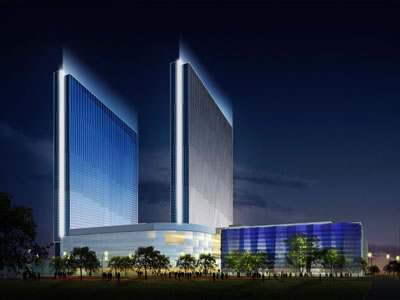 Atlantic City’s newest casino destination, the glistening and opulent tower that is Revel, hasn’t lived up to the hype and promise it was expected to deliver. On the contrary, the $2.4 billion gambling palace that many thought would save Atlantic City has become a poster boy for the town’s drowning future.
Atlantic City’s newest casino destination, the glistening and opulent tower that is Revel, hasn’t lived up to the hype and promise it was expected to deliver. On the contrary, the $2.4 billion gambling palace that many thought would save Atlantic City has become a poster boy for the town’s drowning future.
In a little under five months since it has opened – five months! – the casino is bleeding money faster than a stab wound from Freddy Krueger. And if it continues, Revel could default its loans and be in danger of an unprecedented fizzling out. In an effort to save the ship and right its course, the company has taken the steps ask its lenders for $100 million to survive until 2013, according to the Philadelphia Inquirer. Really, that’s how bad it’s gotten for Revel.
In a statement, Revel chairman and chief executive Kevin DeSanctis was still the picture of optimism, although how many gray hairs he has accumulated remains to be seen. “We appreciate the support of our investors,” DeSanctis said. “Upon completion of this [credit] facility, we will have significant liquidity cushion through 2013 and beyond.”
“We are excited about what we have delivered from a product and experience perspective,” he adds, “and remain confident our strategy and differentiated economic model will result in significant value creation for our stakeholders.”
Judging from the early turnout, DeSanctis’ words has the smell of PR damage control all over it. It becomes even more depressing when you take into account that Revel has fallen drastically short of the $30 million a month revenue figures it was hoping to get just to make ends meet. During the peak summer season, a time when the company expected droves and droves of tourists to flock to the supposedly magnificent palace in Atlantic City, Revel only generated $17.5 million in total casino revenue, a far cry from the $30 million they initially expected to get, with a gross operating loss of $35 million. Factor all that into the equation and Revel isn’t making enough money to offset its operating expenses.
Despite all its promise as the AC’s savior, Revel has also had to scratch and claw its way to even stay relevant in the face of its competition, having failed to even make a dent against some of its neighbors, particularly Borgata, who earned $54 million in total casino revenue last month compared to Revel’s aforementioned $17.5 million.
Gov. Chris Christie, one of the key proponents in the casino and the one responsible for signing off on providing $300 million in state assistance to get Revel built, remains optimistic that Revel will slowly get its feet underneath it. “I always thought that Revel would take a year to get going anyway,” he said earlier this week.
“It’s a totally different model from what’s been done in Atlantic City before. It’s not a model centered around gaming. It’s a model set around the resort aspects of the hotel.”
Maybe, just maybe, there lies the problem, or at the very least, an interpretation of the problem. Christie’s right in saying that Revel is a resort/hotel first and a casino second. But is it possible that everybody involved in the project, the gov included, may have been barking up the wrong tree from the get-go? Their vision would have probably worked if Atlantic City was flourishing, but the combination of the town’s rapid decline and the steady stream of competition that Revel has had to deal with has sent it into a tailspin not usually reserved for an establishment that’s yet to see the sun of its fifth month of operations.
State Sen. James Whelan (D., Atlantic), a former mayor of Atlantic City, might have the best solution to Revel’s woes when he told the Philadelphia Inquirer: “The hope is they can get the dollars they need to not only continuing operating, but also make whatever changes they need to make to strengthen their position.”
“Whether they need to invest more dollars into advertising, or have more events, or attract more conventions, clearly, they’ve got to make some adjustments.”
Or maybe focus more on the casino side of the business. That usually works, too.






